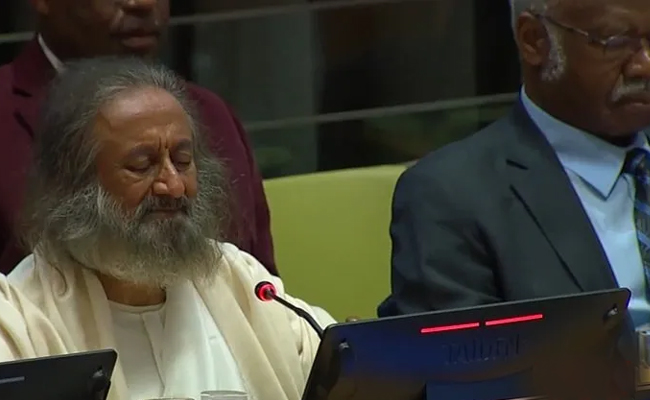
World

Eighteen minutes of tranquility descended on the world organisation’s headquarters consumed by global turmoil as Sri Sri Ravi Shankar led a meditation session as a path to peace at the United Nations.
At that very moment on Friday, the Security Council down the corridor was grappling with “threats to international peace and security” in a bitter debate, having earlier in the day disposed of topics like “children in armed conflicts”, the tensions in the Middle East and Africa, and the Ukraine War.
In the oasis of peace at the Trusteeship Council Chamber, Ravi Shankar presided over the ‘Meditation for Global Peace and Harmony’ on the eve of World Meditation Day newly minted by the General Assembly this month.
He noted that there are a lot of discussions about peace and security at the UN, and meditation can bring inner security and inner peace to make the world a much better place.
“I urge all the nations here to put a little more attention in peace education. Let us educate our young people, how to relax, how to get rid of tensions on a daily basis, how to manage their negative emotions, and be centered”, said Ravi Shankar, who founded the Art of Living Foundation.
The General Assembly adopted by acclamation on December 6 the resolution moved by a core group of India, Liechtenstein, Sri Lanka, Nepal, Mexico, and Andorra, and joined by many others to declare the Winter Solstice Day the World Meditation Day.
It bookends with the International Day of Yoga on Summer Solstice Day, which was also declared by the General Assembly at India’s initiative.
General Assembly President Philemon Yang said, “Meditation transcends borders, faiths, traditions, and time, offering each of us the opportunity to pause, to listen, and to connect with our inner selves.”
“In its silence, meditation speaks a universal truth: That we are all human, all seeking balance, and all striving for a better understanding of our inner self and the world in which we live”, he said.
Under-Secretary-General Atul Khare said that the UN peacekeepers are “tasked with protecting civilians against physical violence, and are often themselves exposed to atrocities, war crimes and crimes against humanity. It is critical that their mental health is taken care of and for this the UN introduced an app in 16 languages that includes meditation to help them.”
India’s Permanent Representative P. Harish said, “The ancient Indian practice of ‘Dhyana’, or meditation, goes back thousands of years to yogic traditions and holds the key to achieve inner calm and attain harmony between mind and body, thought and action, humanity and the external world.”
The winter solstice in the Indian tradition, “is the beginning of ‘uttarayana’, an auspicious time of the year, especially for inner reflection”, he said.
“India's leadership in overall human well-being stems from our civilisational dictum of Vasudaiva Kutumbakam or the whole world is one family”, he added
Advertisment